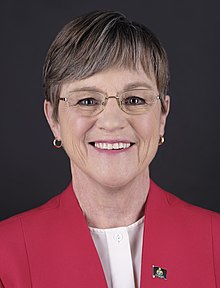Laura Kelly
Laura Kelly (* 24. January 1950 in New York City ) is an American politician of the Democratic Party , and since January 14, 2019 Governor of Kansas . She was a member of the Kansas Senate from 2005 to 2019 .
Career
Laura Kelly was born in New York City and studied psychology at Bradley University , where she received a Bachelor of Science degree. She later received her Masters from the University of Indiana . In 1986 she moved to Kansas and was intermittent director of the Kansas Recreation and Park Association . In 2004, Kelly moved into politics and successfully ran for the Democrats for a seat in the Kansas Senate , the upper house of the state legislature . She took up this position in January 2005. She was re-elected to represent the 18th constituency in 2008, 2012 and 2016. At the end of 2009 she briefly toyed with the idea of running for the US House of Representatives , but ultimately decided against it. During her tenure as State Senator, she was critical of the policies of Republican Governor Sam Brownback and accused him of not caring about adequate funding for the education system.
In December 2017, Kelly announced her candidacy for governor in the 2018 election. As her candidate for the office of lieutenant governor , she chose Lynn Rogers , a parliamentary group colleague from the State Senate. After her victory in the party's internal primary , she was able to secure the Democratic nomination in August 2018. During the election campaign, there was a duel with the right-wing Republican Kris Kobach , who narrowly prevailed in the course of the Republican primary against incumbent Jeff Colyer , who had only succeeded Brownback in January 2018 . Kobach, who previously held the office of Secretary of State , was actively supported by US President Donald Trump and was considered a hardliner , especially on immigration issues . Former Republican governors Mike Hayden and Bill Graves , on the other hand, gave an election recommendation for Kelly. The vote was classified as a head-to-head race from the start, with the non-party applicant Greg Orman long being considered a factor of uncertainty for Kelly. Orman, an entrepreneur with more moderate positions, was predicted to receive up to ten percent of the vote, with support from both political camps, but especially moderate Republicans. Nevertheless, Kelly was given a chance of an election victory, as the state of Kansas, despite its strong tendency towards the Republicans, has repeatedly elected Democratic governors (most recently in 2002 and 2006). In the election on November 6, 2018, Kelly then prevailed with 47.8% of the vote against Kobach, who received 43.3%. 6.5% of voters voted for Orman. As in almost all US states, a simple majority of the votes was enough to win the election. In her election manifesto, Kelly spoke out for an expansion of Medicare and more investments in education. Laura Kelly was sworn in as the 48th governor of Kansas on January 14, 2019.
Private life
Laura Kelly married her husband Ted Daughety, a doctor with whom she lives in Topeka , in 1979 . The couple have two grown daughters.
Web links
- Official website as governor of Kansas (English)
- Personal web presence (English)
- Profile the Kansas Senate (English)
Individual evidence
- ↑ Another former GOP governor of Kansas just endorsed Dem Laura Kelly over Kris Kobach , KansasCity.com, October 18, 2018 (English)
- ↑ Democrat Laura Kelly wins Kansas governor race, CNN projects , CNN, November 7, 2018 (English)
- ↑ Democrat Laura Kelly projected to beat Republican Kris Kobach for Kansas governor: NBC News , CNBC, November 7, 2018 (English)
| personal data | |
|---|---|
| SURNAME | Kelly, Laura |
| BRIEF DESCRIPTION | American politician |
| DATE OF BIRTH | January 24, 1950 |
| PLACE OF BIRTH | New York City |

